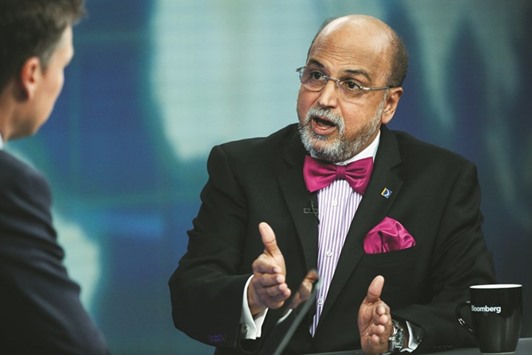Qatar’s banking system is stable and lenders have strong capital-adequacy ratios, helping them to avoid the crisis experienced in 2009, despite a current shortage of liquidity, according to Doha Bank chief executive officer Dr Raghavan Seetharaman
The shortage of liquidity in Qatar is more serious than during the financial crisis, forcing the country’s lenders to adapt their businesses to the low oil-price environment, Seetharaman said.
“Liquidity is a much bigger issue today than it was in 2008,” he said in a TV interview with Bloomberg Markets Middle East yesterday. “All of the Gulf countries were running a fiscal surplus and current account surplus in 2008, today they’re running a fiscal and current account deficit. Every institution, including Doha Bank, has to redefine its business model.”
Bank liquidity in the six-nation Gulf Cooperation Council, which includes Qatar and Saudi Arabia, is tightening as a more than 50% slump in crude since mid-2014 slows deposit growth and pushes the government to boost borrowing. The drop in oil is also forcing some companies in the country, including Qatar Petroleum and Vodafone Qatar, to restructure operations and cut jobs.
Lenders in Qatar are experiencing “extraordinary stress,” the CEO said in a separate interview at the bank’s headquarters in Doha last week. “It’s a challenging time. Liquidity is under stress and governments are having to borrow money externally to improve local market liquidity. Oil and gas companies have scaled down because their revenue streams have been shrinking, which has definitely impacted local consumer retail.”
Qatar banks’ loans-to-deposit ratio, a key measure of liquidity, fell to 130% in April from 125.7% in March, according to central bank data. Lenders in the country are also facing a narrowing in net interest margins and higher interest expenses, Seetharaman said.
Doha Bank is targeting a reduction in non-performing loans to less than 3% in the “next few quarters” from 3.48% currently, he said.
Amid tight liquidity, the bank is also planning to expand its foreign operations to compensate for slower growth in Qatar, Seetharaman said.
“We have scope for expansion,” he said. “The Indian economy is doing well, and we just opened in Bangladesh,” he said, adding that there are opportunities to convert some representative offices in Asia into full-scale branches. It’s not like everything is gloom and doom.”
Doha Bank, which last year raised $500mn on international debt markets and has shareholder approval for another $500mn, is busy with a “due diligence now and we’ll go to the market at the right time,” the CEO said. It will be a combination of commercial paper and an existing Euro Medium Term Note, he said. “We might go for senior debt at a later stage.”
Qatar could raise as much as $5bn in bonds to plug its budget deficit, which could reach QR46.5bn this year, according to people familiar with the matter. Doha Bank plans to subscribe to the bond, but may need to borrow in the short term to finance the deal, Seetharaman said.
“That’s where we do some bilateral borrowing here and there,” he said. “We can always borrow and have a margin. I’m taking efforts to borrow from certain markets. Japanese banks are keen to be here and lend to us.”

Dr Seetharaman gestures as he speaks during a Bloomberg Television interview in London on March 3. Amid tight liquidity, Doha Bank is also planning to expand its foreign operations to compensate for slower growth in Qatar, he said yesterday.
